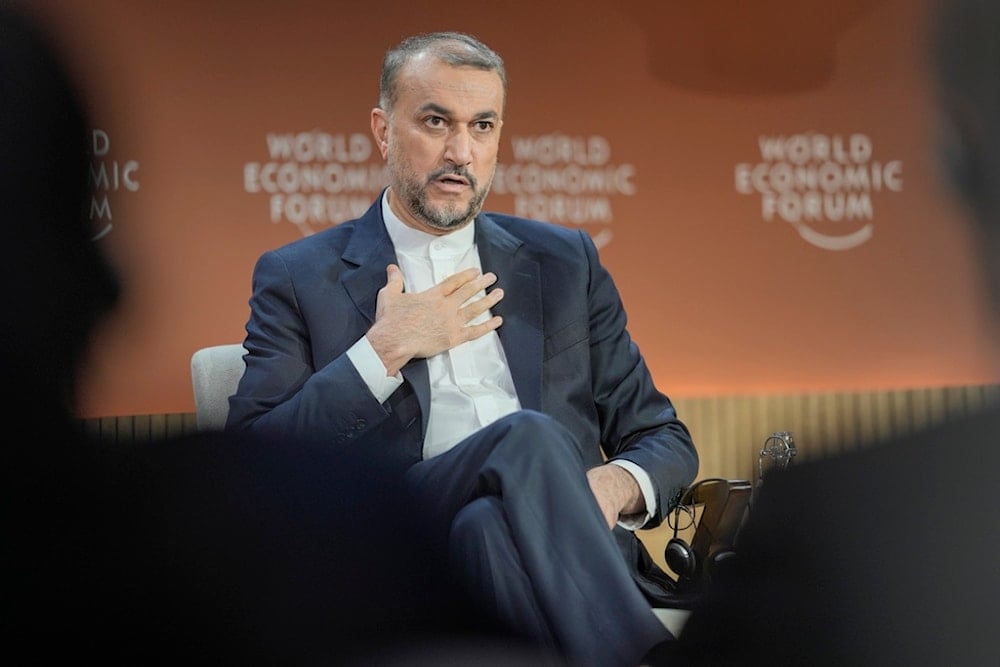Amir-Abdollahian, Haniyeh discuss Hamas' ceasefire response
The head of the political bureau of Hamas thanks the stances of Iranian leader Sayyed Ali Khamenei, President Ebrahim Raisi, and the Iranian people in support of Palestine.
-

Iran's Foreign Minister Hossein Amir-Abdollahian gestures during a discussion at the Annual Meeting of World Economic Forum in Davos, Switzerland, Wednesday, Jan. 17, 2024. (AP/Markus Schreiber)
Iranian Foreign Minister Hossein Amir-Abdollahian said Monday he held a phone conversation with Ismail Haniyeh, the head of the political bureau of Hamas, where the two discussed the latest developments regarding the Israeli war on the Gaza Strip.
Haniyeh thanked the stances of Iranian leader Sayyed Ali Khamenei, President Ebrahim Raisi, and the Iranian people in support of Palestine and Gaza, the top Iranian diplomat wrote on social media.
Amir-Abdollahian said the Hamas leader confirmed the movement agreed on a ceasefire proposal presented by mediators Egypt and Qatar to stop the Israeli aggression, complete a prisoner exchange deal, and lift the siege imposed on the Gaza Strip.
"Now the ball is in the opposite side's court," the Iranian Foreign Minister indicated.
Earlier, Hamas' Media Office said the movement informed mediators that it has agreed to a proposed prisoner exchange and ceasefire deal, awaiting a response from the Israeli occupation leadership.
The announcement came shortly after the Israeli military began Monday the forceful displacement of the already-displaced Palestinian people currently seeking shelter in the densely-populated city of Rafah south of the Gaza Strip, in preparation for a ground military invasion there.
Several countries and international sides reiterated their rejection of an Israeli invasion of the city, warning it would lead to a new massacre against the Palestinian people.
The United States said Monday it was reviewing a response from Hamas to a ceasefire proposal as it renewed calls on "Israel" not to invade the packed Gaza city of Rafah.
State Department Spokesperson Matthew Miller told reporters the United States backed a deal to halt the fighting and release the Israeli captives held by the Palestinian Resistance in Gaza.
Miller reiterated that the United States will not support the invasion of Rafah "currently envisioned by Israel" because it has "not seen a humanitarian plan that is credible and that is implementable."
"We believe a military operation in Rafah right now would dramatically increase the suffering of the Palestinian people (and) would lead to an increase in loss of civilian life," he said.
Biden earlier Monday spoke by telephone with Israeli Prime Minister Benjamin Netanyahu, with the White House saying the president reiterated his "clear" stance on Rafah.
Israeli media reported that there are concerns in "Israel" that the United States will support the new deal agreed by Hamas, which does not meet the criteria agreed upon by Israeli officials.
But the Israeli war cabinet approved a military operation in Rafah "in order to apply military pressure on Hamas, with the goal of making progress on freeing the hostages and the other war aims," Netanyahu's office announced in a statement.
The statement claimed that Hamas’ response to the ceasefire proposal is "far from Israel’s obligatory demands."
According to the document obtained by #AlMayadeen, #Qatar, #Egypt, and the #UnitedStates are the stated guarantors of the agreement.
— Al Mayadeen English (@MayadeenEnglish) May 2, 2024
The continuity of the exchange process hinges on "Israel's" commitment to the deal's clauses, including halting military operations, relocating… pic.twitter.com/m0KhkDOJRZ

 3 Min Read
3 Min Read








